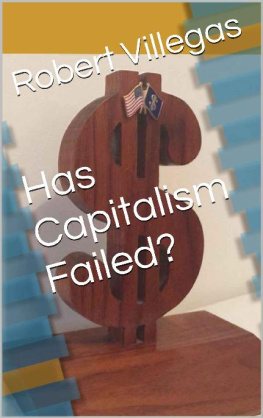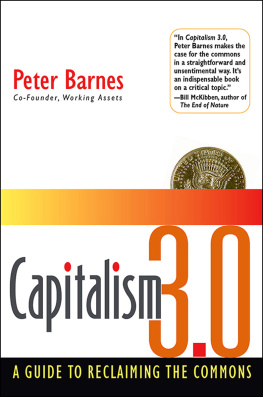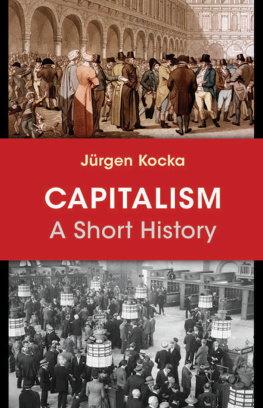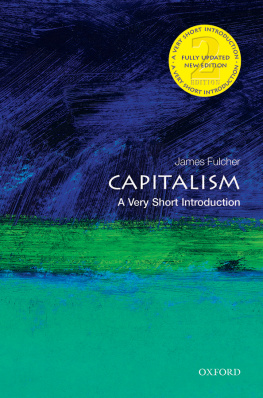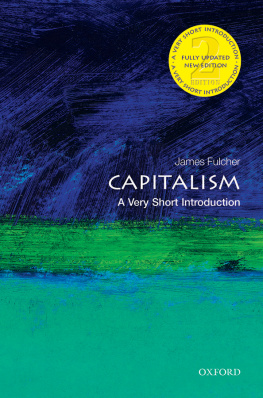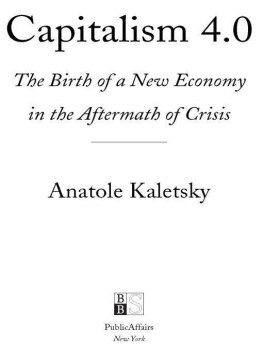REDEEMING
CAPITALISM
Kenneth J. Barnes
WILLIAM B. EERDMANS PUBLISHING COMPANY
GRAND RAPIDS, MICHIGAN
Wm. B. Eerdmans Publishing Co.
2140 Oak Industrial Drive N.E., Grand Rapids, Michigan 49505
www.eerdmans.com
2018 Kenneth J. Barnes
All rights reserved
Published 2018
2726252423222120191812345678910
ISBN 978-0-8028-7557-0
eISBN 978-1-4674-5039-3
Library of Congress Cataloging-in-Publication Data
Names: Barnes, Kenneth J., 1957 author.
Title: Redeeming capitalism / Kenneth J. Barnes.
Description: Grand Rapids : Eerdmans Publishing Co., 2018. | Includes bibliographical references and index.
Identifiers: LCCN 2017060601 | ISBN 9780802875570 (hardcover : alk. paper)
Subjects: LCSH: CapitalismReligious aspectsChristianity.
Classification: LCC BR115.C3 B38 2018 | DDC 261.8/5dc23
LC record available at https://lccn.loc.gov/2017060601
The author is represented by MacGregor Literary Inc.
All Scripture quotations, unless otherwise indicated, are taken from the Holy Bible, New International Version, NIV. Copyright 1973, 1978, 1984, 2011 by Biblica, Inc. Used by permission of Zondervan. All rights reserved worldwide. www.zondervan.com The NIV and New International Version are trademarks registered in the United States Patent and Trademark Office by Biblica, Inc.
To Steve and Diane Eyre
CONTENTS
This book matters because capitalism matters. Arguably, global capitalism is among the most pervasive and most powerful forces in the world today, and it is a force for good and for illfor much good and much ill. This is why capitalism needs reforming, or redeeming, as the title of the book puts it, using a favorite Christian metaphor for overcoming sin and its consequences. Redeeming Capitalism is a nuanced and critical Christian procapitalism voice in the important debate about the future of capitalism.
Very few people today would contest the claim that capitalism needs reforming, but increasingly many are questioning whether capitalism deserves reforming. One pillar of Barness argument is his claim that no economic system today represents a better, workable alternative to capitalism. It is important to note this right at the outset, for much of the book depends on this claim. I dont read Barnes to say that a better alternative to capitalism cannot be imagined. It would be strange for a Christian to argue that capitalism is unsurpassable in principle. Christian hope for the end of history, to use the phrase popularized by political scientist Francis Fukuyama, is not the victory of capitalism, not even the victory of some superefficient, eco-friendly, and humane form of capitalism. Christian hope is for the new world that comes from God, a world that John the Seer describes as the home of God among the mortals. According to the first two books of the Bible (Genesis and Exodus), the goal of the creation is the establishment of the tabernacle, Gods dwelling place among the people of Israel. The last two chapters of the last book of the Bible (Revelation 2122) record a broadening of this vision: the entire world, nature and culture, is Gods holy of holies, the place of flourishing life, justice, abundance, and security that God indwells.
From the perspective of this grand vision, all economic systems, capitalism included, are interim arrangements. But as an interim arrangement, capitalism is irreplaceable, at least it is so in todays globalized world. Loosely using some terms from soteriology, the branch of theology that explores the nature of salvation, you might say that capitalism is justified not so much by the goods it helps create but by its irreplaceability, by the facts that better alternatives are unavailable and that, in any case, the abolition of global capitalism would require something like a worldwide revolution and therefore cause more harm than good. Justified in this twofold way, capitalism remains a sinner. Thats why it both deserves and needs reforming. In soteriology, the process of reform is called sanctification. Capitalism is badly in need of sanctification. Thats one of the main points of Redeeming Capitalism.
To know that capitalism needs reforming we dont need to appeal to the lofty perfection of the eschatological vision! Simple moral convictions will suffice, convictions formulated with the view of the world as it presently is, inhabited by finite and fallible beings living in fragile environments. To illustrate the need for reform, take just one Christian conviction. Christians have always believed that the poor are Gods first love, to use a felicitous phrase of Pope Benedict XVI, not known for his radical politics. For the capitalism of today, however, the poor seem to be the last concern. True, unprecedented economic growth over the last half century or so has lifted many out of poverty. Still, a long, dark shadow of growing disparity in wealth and power has trailed this stunning economic growth, with opulent and powerful elites living alongside an underclass made up of millions upon millions of hopelessly poor, overworked, and disenfranchised people. The sufferings of the poor are an indictment against current forms of capitalism; their groaning, like the groaning of the Jews in the ancient Egypt of the great pharaohs, is a cry for redemption and therefore reform. (A parallel line of argument for the reform of capitalism, the one that concerns its relation to the entire ecosystem, could start with the biblical statement, God saw everything that he had made, and indeed, it was very good [Genesis 1:31].)
It isnt only on account of its effects that capitalism needs reforming, however. Many students of capitalism have noted inner tensions and inherent instabilities in the functioning of capitalism itself, the most famousnot necessarily the most compelling!among them being Karl Marx, who argued that capitalisms inner tensions will inevitably lead to its eventual collapse. Barnes is much more nuanced; he is no Marxist. In Redeeming Capitalism, he highlights two related tensions within capitalism. One is between the kinds of structural interventions capitalism needs to function well and the resistances to these interventions that the inner logic of its operation generates. The other is a tension between the moral ecology presupposed by a responsible capitalism and the kind of amoral world in which it operates today and which it in fact helps to generate.
Barness main concern is the second tension, the moral vacuum at the heart of capitalism, as he puts it. For without bringing a moral vision to bear on capitalism, the first tension cannot be addressed and its deleterious effects cannot be remedied. Three central claims give Redeeming Capitalism urgency:
- no good substitutes for capitalism are available;
- capitalism is self-undermining and destructive without moral convictions to regulate it;
- capitalism has insulated itself against these convictions.
The book is a call to reimagine and reform capitalism as a moral enterprise so it can become a morally steered servant rather than a cruel, amoral master. Subduing global capitalism is a difficult mountain to scale, a Mt. Everest of social engagement. But climb it we must. And climb it we can, even if it is one step at a time and only part of the way.
Redeeming Capitalism isnt just about bringing morality to capitalism, though. Its also, and below the surface perhaps primarily, about the place of economics in who we see ourselves to be as humans and about how we understand the basic orientation of our lives. Its an endeavor to align capitalism not just with common morality but with our very humanity. The very first words of the book, a quotation from Jesuss Sermon on the Mount, are meant to set the direction for the entire project: For where your treasure is, there your heart will be also (Matthew 6:21). Note the relation between the treasure and the heart: the heart doesnt determine the treasure (as Christian champions of unredeemed capitalism have often insisted); its the other way around: the treasure pulls the heart to itself. Where should human treasure be so that the heart would end up in the same place as well? In the same sermon, Jesus gives the answer: But strive first for the kingdom of God and his righteousness, and all these things will be given to you as well (v. 33). For Christians, the great challenge behind the moral challenge is to reform capitalism so that, sinner that it will always remain, it can still be integrated into the striving for the kingdom of God as the true location of human hearts and the true goal of our lives.


